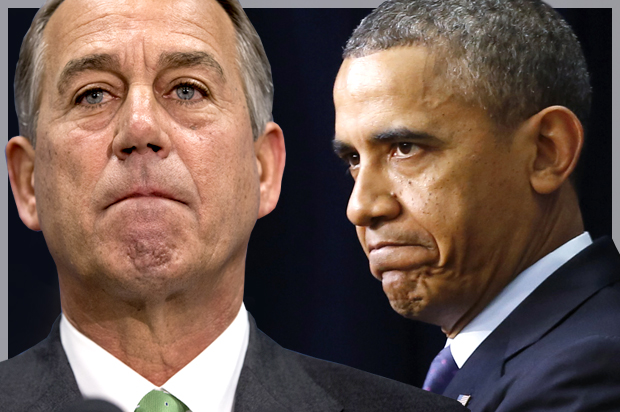So President Obama has had himself a hell of a week. His nomination of Loretta Lynch to replace Eric Holder as attorney general was widely acclaimed, he unveiled a new and groundbreaking deal with China to drastically reduce carbon emissions, and he delighted progressive activists by taking an unexpectedly strong stand on net neutrality. To cap it all off, the White House finally unveiled what Obama’s long-promised executive actions on immigration might look like.
The details of the proposed actions are still under wraps, but the New York Times laid out the broad contours of what the president intends to do. Per the Times, as many as 5 million undocumented immigrants could be shielded from deportation by the proposals under consideration (compared to the roughly 8 million who would have been covered by the Senate immigration bill). To me, at least, the rough proposals feel ambitious, though that’s probably due to the fact that the White House has made a point of tamping down expectations. (Immigration activists are decidedly lukewarm on what they’ve seen thus far.)
Based on what’s been reported, the top priority seems to be on keeping families together. “One key piece of the order,” the New York Times reports, “will allow many parents of children who are American citizens or legal residents to obtain legal work documents and no longer worry about being discovered.” The plan could also expand the Deferred Action for Childhood Arrivals (DACA) program to the parents of children brought to the country illegally.
That’s a significant policy shift. The breaking up of families through deportations has lasting emotional and economic consequences for the people left behind and the communities that must then support them. Since 1998, more than 660,000 children born in the United States to undocumented parents have lost at least one parent to deportation. For those families to lose one or both sources of income puts greater strain on social services and the safety net. One of the chief complaints from immigration activists about the administration’s ramping up of deportation orders was that families were being torn apart.
Acting aggressively to maintain family cohesion gives the administration a strong moral case to pitch to the public. And they’ll need that because up to this point their handling of the politics surrounding this issue has been terrible and accomplished little beyond giving everyone cause to distrust the president on immigration. Obama’s decision to delay action until after the midterms backfired in pretty much every way it could: The red state Democrats the delay was meant to protect all went down to defeat, and Republicans are still claiming that the election was a referendum on Obama’s “executive amnesty.”
At the time, Obama said that the reason for delay wasn’t political (hah!) but that he just needed time to explain to America what his thinking was. “It’s going to be more sustainable and more effective,” Obama said, “if the public understands what the facts are on immigration, what we’ve done on unaccompanied children, and why [executive action is] necessary.” To my knowledge, he still hasn’t made that case, and the fact that crass political consideration impelled him to delay action leaves open the suggestion that those same considerations are driving him to act now.
What they have succeeded at, however, is once again dividing the GOP along its existing fault lines on immigration. The Republicans, not two weeks removed from their sweeping electoral triumph, are already at each other’s throats over how to oppose Obama’s executive action. The Republican leadership in the House and Senate are, quite sensibly, keen to avoid any sort of confrontation over government funding that could drag them into a shutdown fight. They just want to get a spending bill passed before the Dec. 11 deadline and look ahead to the next session of Congress. Mitch McConnell, fresh off his election as incoming Senate majority leader, told reporters yesterday that he had no intention of getting into a shutdown fight over Obama’s immigration action.
Even if that’s true, the decision isn’t entirely up to him. Conservatives in the House of Representatives are spoiling for a fight on this issue. Over 50 House Republicans signed a letter to Hal Rogers, chairman of the Appropriations Committee, expressing their eagerness to include language in the government funding bill prohibiting the president from taking unilateral action on immigration. Rogers doesn’t want that: “I’ve always heard that you should not take a hostage that you can’t shoot.” But what the House leadership wants on immigration isn’t always what ends up being voted on. Boehner didn’t want this summer’s border crisis legislation to contain any language defunding DACA, and he ended up caving because conservatives refused to support him otherwise. They’re already questioning Boehner’s leadership and his commitment to obstructing Obama’s proposed action.
What will happen when Obama finally does act is that Republicans will lurch further to the right, start talking about trying to sue Obama again, and maybe even revive the impeachment chatter. What they won’t do – they’ve promised as much – is take any meaningful legislative action on immigration reform. They’d provide a good foil to the White House, particularly if the president hammers home the idea that he’s acting to keep families together. That leaves the Republicans making process arguments as they try to explain why their commitment to inaction is an excuse for Obama to stand still.

